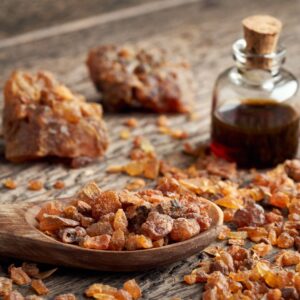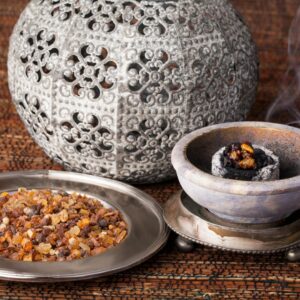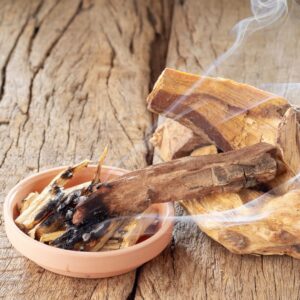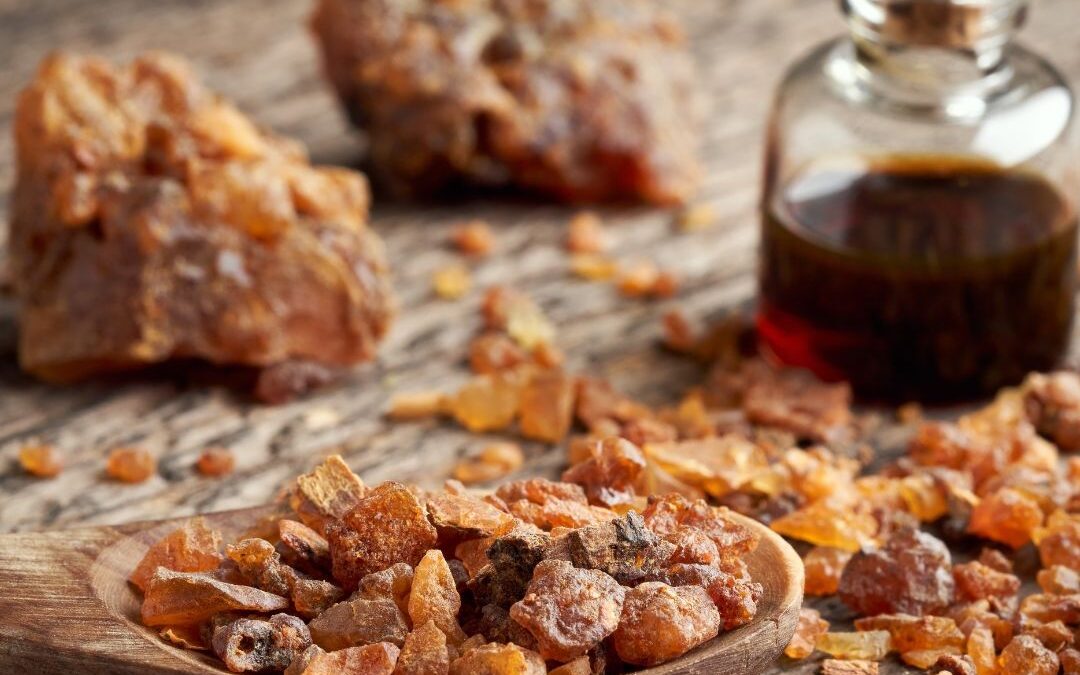
Myrrh or Commiphora myrrha comes from a family of Commiphora trees that are found in Yemen, Somalia and Ethiopia.
The medicine is a resin that’s collected from the tree’s branches and it’s dried for later use.
How to make myrrh tincture
Because it’s a resin it doesn’t dissolve in water. So if you’re making a tincture from it, you need to ensure that the alcohol by volume is at least 90%. It needs to be shaken well before it’s used so that your shaking creates a temporary emulsion.
Cleaning wounds with myrrh
This combination of the natural properties of myrrh and the high alcohol makes it your go to for disinfecting wounds. But beware, the high alcohol content in the tincture does make it sting a bit. It’s broadly antibacterial, it’s also effective against two waterborne parasites, liver fluke and schistosomiasis.

It’s also astringent. So think about the combination of those properties in terms of closing wounds and keeping them clean.
Many of the music festivals have a herbal first aid tent, and powdered myrrh is used around the clock for those party induced scrapes and gashes.
Antibacterial properties of myrrh

It’s effective against airborne bacteria. So if somebody in your house has a chest based bacterial infection, for example, burn some myrrh resin on a charcoal disc to disinfect the air.
You can also use an essential oil in a steam burner.
Myrrh is also your bathroom cupboard go to for mouth infections, mouth ulcers and sore throats. It’s quite bitter but you do get used to the taste.
How to make a myrrh gargle
To make your gargle add a teaspoon of myrrh tincture to half a cup of water. Swirl it around on the glass to create that temporary emulsion. You will know it’s hanging together because the liquid will be a creamy colour.

Swish it around in your mouth for good dental health or gargle it if your throat feels a bit sore.
Don’t worry if you swallow some as it’s combination of disinfecting and tightening makes it a great digestive herb as well, and it’s good for the liver.
Researchers also confirmed as traditional use for gingivitis and bad breath. It’s known to heal mouth ulcers and its anti inflammatory action calms the redness and swelling associated with gum disease.
Myrrh is an anti-inflammatory and skin herb
It’s a wonderful skin herb, particularly in relation to acne, weeping eczema and bed sores. It reduces pain and it has some effect as a pain relieving anti inflammatory when it’s applied to sore muscles and joints.
myrrh muscle rub recipe

The essential oil of myrrh is a great after exercise rubdown. Add 40 drops of essential oil to 100 mls of olive oil.
If you need it to be a bit more glidy on your skin, experiment with substituting some of the olive oil with grapeseed oil until you get your preferred consistency. Grapeseed oil is really slippery.
It doesn’t need to be entirely myrrh based. Get creative. Maybe add in some essential oils of ginger, wintergreen. But not if you’re allergic to aspirin as wintergreen is full of salicylates. Try some lavender or some lemon.
Spiritual practices using myrrh

Whilest we’ve talked about the medicinal properties of myrrh, its use is so much more than physical ailments.
It’s often associated with spiritual practices, and it’s known as a herb that is calming and grounding and invokes a sense of reverence and invites us to step into a space of contemplation and reflection.
It’s use in embalming so it accompanies us from this world to the next. Commiphora myrrha is definitely one for the herbal first aid kit.
How I prefer to use myrrh
Personally my preference is to keep it in tincture form. That way I can easily convert it into a mouthwash or a gargle, dab it on that annoying spot that appears in the middle of your face just before a big event. You can create a liniment by combining equal amounts of the myrrh tincture with an oil. Shake it well and rub it briskly into the sore area.
Plant medicine is potent medicine
If you have any underlying health conditions, you’re pregnant or trying to get pregnant, or you’re lactating; or you’re taking any medications don’t just rely on the information in this episode. Just because it’s natural, it doesn’t necessarily mean it’s good for you.
Please do get individualised advice by consulting with your medical herbalist. Not only are they trained in which herbs affect a particular health condition or your current life season, they’re also trained in herb drug interactions and choosing exactly the right herb for you.
Your body knows exactly what it needs to heal itself. Be that herbal, pharmaceutical, food based, emotion or mind medicine. My job, as your herbalist, is to connect you with the herbs your body is already searching for.

